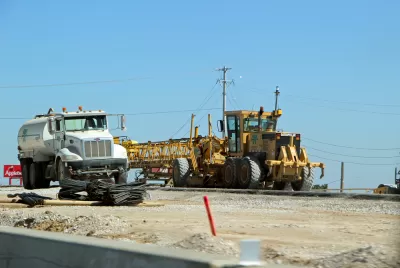Senators McConnell and Capito reject the administration's efforts to steer federal funds to infrastructure projects that prioritize road maintenance and transit and pedestrian improvements over new road construction.

As reported in an article by Daniel C. Vock for Route Fifty, Senate Majority Leader Mitch McConnell and U.S. Sen. Shelley Moore Capito of West Virginia are advising state governors to ignore the recommendations issued by the Federal Highway Administration in a December memo. These recommendations promote "projects that promise to reduce carbon emissions, expand transit, add bike lanes and incorporate stakeholders like local governments" and encourage making improvements to existing roads instead of building new ones in an effort to limit the expansion of highways and shift focus to infrastructure that benefits pedestrian, cyclists, and transit users as well as drivers.
According to McConnell and Capito, "'Congress never envisioned the [infrastructure law] to be a 'unique opportunity' for FHWA to ‘evolve the century-old relationship with state departments of transportation' as the FHWA memorandum suggests.'" The senators claim the law does not give FHWA any added authority to dictate how funds are used or which projects are prioritized.
As Vock writes, "The missive is the latest in a wave of criticism, especially among Republicans, about the Biden administration’s attempts to steer money that, by law, goes to state governments with very few strings attached." The attempt to steer "formula" funds to specific types of projects is "unusual," says Vock, as administrations usually do this through discretionary and competitive grant programs.
FULL STORY: McConnell Tells Governors They Can Ignore Biden Highway Priorities

Planetizen Federal Action Tracker
A weekly monitor of how Trump’s orders and actions are impacting planners and planning in America.

Maui's Vacation Rental Debate Turns Ugly
Verbal attacks, misinformation campaigns and fistfights plague a high-stakes debate to convert thousands of vacation rentals into long-term housing.

Restaurant Patios Were a Pandemic Win — Why Were They so Hard to Keep?
Social distancing requirements and changes in travel patterns prompted cities to pilot new uses for street and sidewalk space. Then it got complicated.

In California Battle of Housing vs. Environment, Housing Just Won
A new state law significantly limits the power of CEQA, an environmental review law that served as a powerful tool for blocking new development.

Boulder Eliminates Parking Minimums Citywide
Officials estimate the cost of building a single underground parking space at up to $100,000.

Orange County, Florida Adopts Largest US “Sprawl Repair” Code
The ‘Orange Code’ seeks to rectify decades of sprawl-inducing, car-oriented development.
Urban Design for Planners 1: Software Tools
This six-course series explores essential urban design concepts using open source software and equips planners with the tools they need to participate fully in the urban design process.
Planning for Universal Design
Learn the tools for implementing Universal Design in planning regulations.
Heyer Gruel & Associates PA
JM Goldson LLC
Custer County Colorado
City of Camden Redevelopment Agency
City of Astoria
Transportation Research & Education Center (TREC) at Portland State University
Jefferson Parish Government
Camden Redevelopment Agency
City of Claremont





























